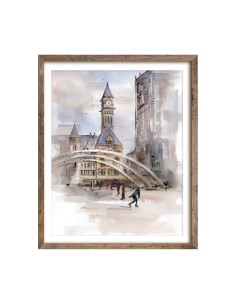- Mahsa S. Y.
- information
- 549 views
- 1 comments
Canada is often recognized for its diverse population, breathtaking landscapes, and high quality of life. However, adjusting to life in the Great White North can bring some surprises. Here are some cultural shocks that newcomers may encounter when immigrating to Canada.
Weather Extremes: From Scorching Summers to Harsh Winters
Canada is a land of extreme weather conditions. While the summers can be quite hot, especially in cities like Toronto and Montreal, the winter months can bring brutally cold temperatures, particularly in the northern provinces and cities like Winnipeg. Snow can last for months, and Canadians have adapted to winter in impressive ways, from heated sidewalks in some areas to the celebration of winter festivals. If you're not used to layering up and bundling in parkas, the weather can be a shock to your system. Anyway, don't worry about cold seasons; you can have fun in that climate, too. For instance, there are many fall entertainments in Canada that you can have in the beautiful Canadian autumn.

Politeness and the Ubiquitous Use of "Sorry"
Canadians are globally renowned for their politeness. You'll quickly notice that the word "sorry" is used in everyday situations, often in contexts where an apology might seem unnecessary. Someone might apologize if you bump into them, or even apologize when they've done nothing wrong! This habit can be confusing or amusing for newcomers. Still, it speaks to the deep-rooted Canadian politeness and desire to maintain harmonious social interactions.
Multiculturalism: A Tapestry of Cultures
Canada takes pride in its multicultural identity, and it's common to encounter people from all over the world. In major cities like Vancouver, Toronto, and Montreal, the diversity is even more pronounced, with ethnic enclaves, restaurants from every continent, and festivals celebrating different heritages. Newcomers may be surprised at how seamlessly different cultures coexist and how integral multiculturalism is to the fabric of Canadian society.
Multiculturalism is one of the wonders of Canada's land. If you are interested in knowing about this matter, click on "Cultures in Canada."
Queuing: A Deep-Rooted Love for Waiting in Line
Canadians are exceptionally patient when it comes to queuing. Whether at the grocery store, a public event, or waiting for public transportation, forming an orderly line is a cultural norm that's strictly followed. Jumping ahead in line is seen as incredibly rude. It might earn you disapproving glares or comments. Suppose you're coming from a country where personal space and line etiquette are not as rigid. In that case, this might be a surprising adjustment.
Cyrus Crafts; Luxury & Unique Products
Sports Culture: The National Obsession with Hockey
Hockey isn't just a sport in Canada; it's a passion that runs deep in the national psyche. Newcomers might be surprised by the enthusiasm with which Canadians follow and discuss hockey, particularly during the NHL season. The sport is a key part of the country's identity, and many communities host local hockey games. Even if you're not a fan, it won't be long before you're caught up in a conversation about the latest game or Stanley Cup predictions. It's also not unusual for Canadians to wake up in the early hours of the morning to catch a big game.

French-English Bilingualism: Navigating Two Official Languages
Although most of Canada predominantly speaks English, French is the official language in Quebec and one of the two national languages. Newcomers may be surprised by how bilingual the country is, with official government documents, signs, and announcements available in both languages. In some regions, such as Montreal, you'll frequently switch between French and English in daily conversations. If you move to Quebec, adjusting to the predominance of French may be a cultural shock, particularly in workplace settings.
Casual and Friendly Interactions: Informality in Social Settings
While Canadians are polite, they also value casual and approachable social interactions. You might be surprised by how quickly people address each other by their first names, including in professional settings. Conversations with strangers in public spaces, such as parks or cafés, are not uncommon, especially in smaller towns. The friendliness can be disorienting if you come from a culture where formality and social distance are more common.
Tipping Culture: Knowing When and How Much to Tip
Canada's tipping culture can be a surprise to newcomers, particularly those from countries where tipping is not customary. In restaurants, tipping between 15-20% of the total bill is expected, and you should also tip hairdressers, taxi drivers, and other service workers. Failing to tip appropriately may be considered rude or inconsiderate, as many workers rely on tips to supplement their wages.
Canada Immigrants' Cultural Shocks Review
Canada's welcoming and diverse nature makes it a great destination for immigrants. Still, like any new country, it comes with its cultural nuances and quirks. From the famed politeness to the sports-driven culture and bilingualism, embracing these differences will help newcomers integrate more smoothly into Canadian society. For example, Olabisi Adesina says: "Becoming a Canadian citizen has brought culture shock but also changed my perspective in positive ways," she has some ways to face cultural shocks. Nevertheless, Canada is one of the best countries for starting new businesses, as CyrusCrafts has done.
CyrusCrafts, an international drop-shipping company based in Toronto, Ontario, Canada, presents the world various products, including luxury and unique Persian rugs, homeware furniture, one-of-a-kind decorative items, handmade clothes & accessories, and even healthy & organic food items. To order any of these items, you only need to fill out their order forms or send us a message on WhatsApp by clicking the icon. Please feel free to ask any questions on WhatsApp or leave a comment. Moreover, it would be a pleasure for us to see your opinions about this blog post in the comments section.
















Comments (1)